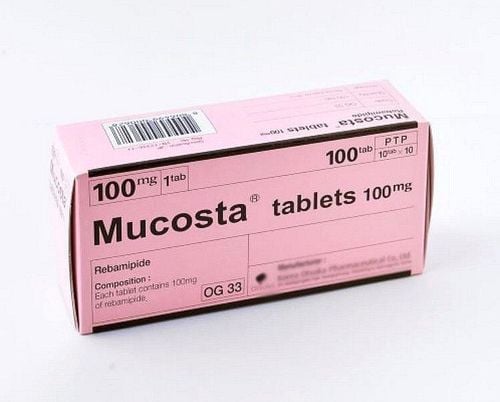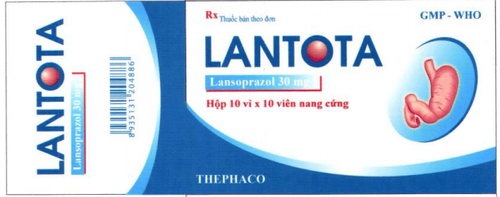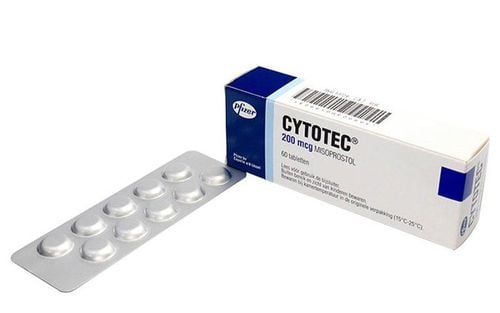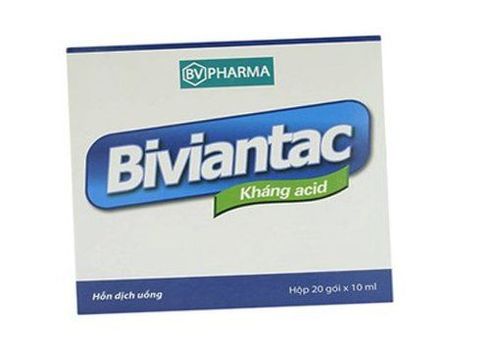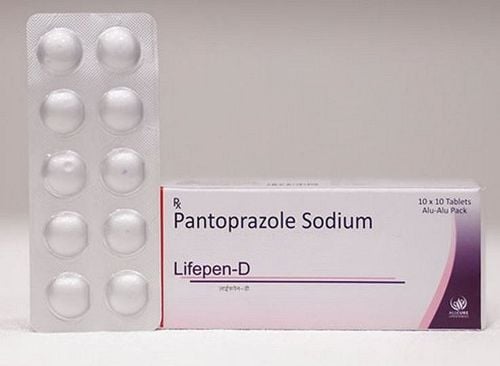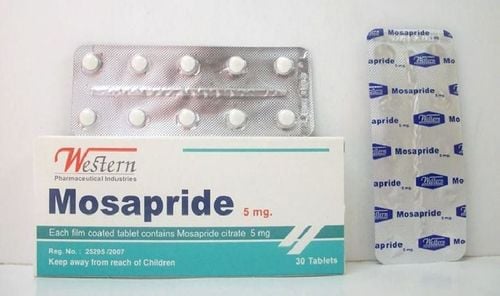This is an automatically translated article.
The article is professionally consulted by Master, Doctor Vu Huy Binh - Department of Medical Examination & Internal Medicine - Vinmec Hai Phong International General Hospital. Doctor has 09 years of experience in the field of Gastrointestinal Endoscopy.Helicobacter pylori in the stomach can invade the mucosal layer leading to many complications. For the treatment of ulcers caused by HP infection, in addition to using antibiotics and drugs to treat, there are now recommendations for food treatment.
1. Helicobacter pylori infection
Helicobacter pylori (HP) infection occurs when this bacterium infects the stomach. This usually happens in childhood. This is also a common cause of stomach ulcers.Most people don't realize the cause of their HP infection until they start to have symptoms of a stomach ulcer and get checked out by a specialist. Helicobacter pylori infection can be treated with antibiotics.
2. Symptoms of HP infection
The vast majority of people who are initially infected with HP will not have any signs or symptoms. In addition, there are still some people with an innate ability to resist the harmful effects of HP bacteria, but there is no basis to explain this clearly.Some of the signs and symptoms that occur with HP infection may include:
Pain or burning in the abdomen. Abdominal pain is worse when the stomach is empty. Nausea and vomiting. Eating does not feel good. Frequent burping and bloating. Losing weight out of control. If in case there are unusual signs and symptoms along with persistent time, it should be checked by a specialist doctor. These signs and symptoms include:
Severe and persistent abdominal pain. Has difficulty swallowing. Stools are black and sometimes bloody. Vomiting or vomiting blood.
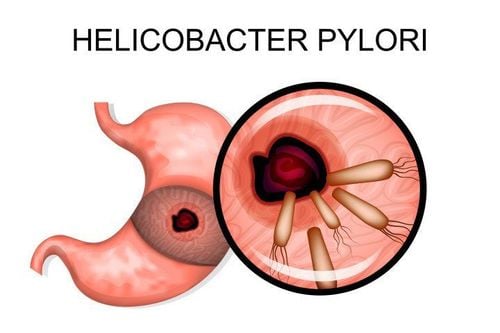
3. Causes of HP infection
Researchers have not found any evidence that proves the exact cause of HP infection . However, HP bacteria can be passed from one person to another through direct contact with HP-contaminated saliva, vomit or stool. It can also be spread through contaminated food or water.4. Risk factors for HP infection
Risk factors leading to HP infection are related to living conditions in childhood, such as:Living in crowded conditions. This is a risk factor for HP infection that is higher if you live in a home with many people. Live in an area without a source of clean water. Live in a developing country. Because living in this area is relatively crowded and unsanitary problems are common, the risk of HP infection is higher. Living with a patient infected with HP is more likely to become infected.
5. Complications of HP infection
Complications associated with HP infection include:Gastric ulcers caused by Helicobacter pylori can thin the protective lining of the stomach and small intestine. This can allow stomach acid to create an open wound (ulcer). About 10% of people infected with HP will develop ulcers. Gastritis: HP infection can irritate the stomach, causing inflammation (gastritis). Stomach cancer: HP infection is a high risk factor for some types of stomach cancer.
6. Treatment of HP infection with food
Stomach ulcers caused by Helicobacter pylori will likely need to be treated with antibiotics. Strict adherence to the treatment plan and close follow-up with your doctor is the way to ensure the treatment is working. It also helps the sores to gradually heal. However, in certain cases, your doctor may prescribe medication to keep your stomach from making or secreting more acid than usual. This medication may be a proton pump inhibitor or an H2 receptor blocker.In addition to the antibiotics and gastric acid suppressants recommended by doctors to treat ulcers, there are now recommendations for treating HP with food. Based on many studies and results, it is suggested that some foods may have ingredients that fight H.
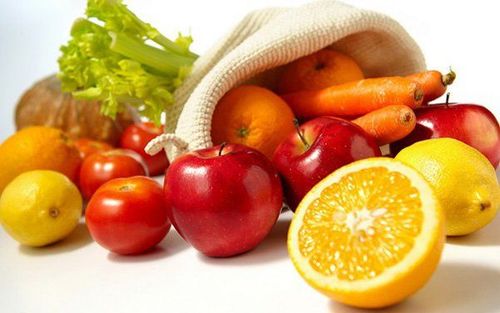
6.1. What to eat when infected with HP?
People infected with HP should eat foods such as:Vegetables and fruits: Cauliflower, cabbage, radishes, apples, blueberries, raspberries, blackberries, strawberries, cherries, bell peppers , carrots, broccoli, green leafy vegetables (kale, spinach). Foods rich in probiotics such as yogurt, kefir, sauerkraut, kimchi. Some other foods: olive oil, other vegetable oils, honey, garlic, decaffeinated green tea, licorice, turmeric. It could be explained that these are foods rich in beneficial antioxidants. They help protect and stimulate the immune system and help fight infections in the body. As such, they may also help protect against stomach cancer.
With foods like blueberries, cherries and bell peppers proven to have the best antioxidant capacity. Green vegetables, especially kale and spinach, in addition to antioxidants, also contain calcium and B vitamins. Or, like broccoli, contain sulforaphane, a compound capable of inhibiting the activity of HP bacteria.
Some studies show that fatty acids in olive oil can treat HP infections. Particularly, fermented foods have brought great effects in clinical studies to treat HP infection. Foods such as miso, sauerkraut or kimchi may also be able to prevent re-infection with HP. In addition, turmeric is also currently being investigated as a potential treatment for peptic ulcer disease caused by Helicobacter pylori.
If peptic ulcer disease is being treated with antibiotics, consider adding probiotics as part of your daily diet. To do this, consult your doctor about the best probiotics that can be taken along with antibiotics. This additional process helps to reduce antibiotic-associated symptoms as well as improve the effectiveness of antibiotics. For example, supplements such as Lactobacillus, Bifidobacterium, and Saccharomyces have shown benefit and effectiveness in people with ulcers caused by HP infection.
6.2. What should not eat if infected with HP?
In some people, ulcers caused by HP infection may also be accompanied by gastroesophageal reflux caused by food. These foods relax the lower part of the esophagus known as lower esophageal spasm (LES). When this symptom occurs, acid easily enters the esophagus and causes heartburn, indigestion and pain.
Foods that HP infected patients should not eat include: coffee, chocolate, hot spicy foods, alcohol, acidic foods such as oranges, tangerines, tomatoes...
7. Prevention of HP infection
HP infection and its complications are common. So sometimes specialists can still test healthy people for HP. The benefit of treating HP in the absence of signs or symptoms of HP infection is controversial among specialists.
To prevent the disease effectively, we should see a doctor for advice, examination and screening if there is a suspicion of exposure to HP bacteria or a suspected risk of stomach cancer.
Most HP infections caused by HP bacteria are treatable. But if stomach ulcers are not treated early, they can lead to more serious problems like internal bleeding and stomach cancer.
Early detection of HP bacteria makes the treatment process more effective. At Vinmec International General Hospital, 13C carbon isotope is used in the breath test to diagnose H. pylori bacteria with a superior machine with 02 airbags, giving both very high diagnostic value (> 95%) and high diagnostic value. ensure patient safety.
Please dial HOTLINE for more information or register for an appointment HERE. Download MyVinmec app to make appointments faster and to manage your bookings easily.
References: Mayoclinic.org





